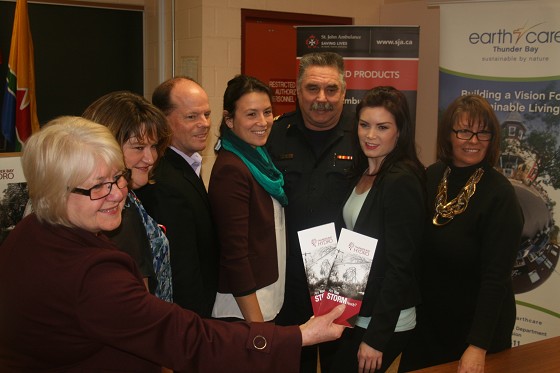RESIDENTS URGED TO BECOME “STORM READY”

Thunder Bay Hydro in the fall launched the STORM READY campaign with a group of community partners. They are telling residents to “Know the Risks, Have a Plan and Make a Kit”. The message is backed up by an online quiz that tackles incorrect attitudes that, if left intact, would leave residents and their families quite vulnerable in a severe weather event. Brochures are being inserted into all Thunder Bay Hydro bills starting this month. Residents are encouraged to take a quiz to identify areas where they may have misconceptions about how to handle a storm-related emergency. Displays will be set up in local libraries. A local report compiled by EarthCare Thunder Bay1 warns that extreme weather events are expected to increase in the region. Other emergency planning exercises recognize that the Thunder Bay area has a high degree of probability to be crippled by a winter storm. These storms can cause interruptions in basic services and households that do not prepare ahead can be at risk of injury and even loss of life. The 2013 GTA Ice Storm and disturbing research findings2 show that most Canadians are not aware of their responsibility to be prepared to be without basic services in the event of a severe weather emergency. The STORM READY campaign is designed to encourage residents to review their personal household situation and plan ahead to take care of themselves and their family for the crucial 72 hours following the advent of an emergency. The online quiz is available at www.tbhydro.com/quiz .
Hardcopies can be picked up and submitted to Lakehead Social Planning Council in
Victoriaville Mall. The messaging was developed in consultation with the Canadian Red Cross, St. John’s Ambulance, Lakehead Social Planning Council / 211, Thunder Bay Fire and Rescue, EMS, EarthCare Thunder Bay and the City of Thunder Bay.
COMPAS survey for Canadian Centre for Emergency Preparedness (2008) Background Information COMPAS survey 2008 A survey conducted for the Canadian Centre for Emergency Preparedness finds disturbing public attitudes towards emergency preparedness. · Households claim to have a plan, but it is not well thought out or emergency kit contents are lacking · There is a high expectation that the public sector will solve their problems in an emergency · The public often thinks to turn to specific first responders for information when these organizations lack the capacity for the customer service volumes during an emergency because they are simply all redeployed to deal with the actual emergency Thunder Bay Climate Change Research Project: Final Report 2014 Extreme weather is becoming more frequent. Prolonged heat waves, torrential
rain storms, windstorms and drought have increased in Ontario. Because the Earth’s climate is changing, major climatic changes may occur in Thunder Bay. Here are some excerpts from the above noted report published by EarthCare Thunder Bay: Extreme Weather Events “Extreme weather events refer to weather that is unusual, severe or unseasonal in comparison to historical records. These events come in the form of extreme heat days, more instances of extreme precipitation and flooding, wind, hail and ice storms (ICLEI Canada, 2013). According to the International Panel on Climate Change North AmericanReport (2014), there is already an observed increase in the occurrence of severe hot weather events, decreases in frost days, and increases in heavy precipitation over much of North America. It is further projected that climate change could induce elevated mortality/morbidity from heat waves, floods, and droughts as well as the heavy rainfall related flooding risks (Cheng, et al, 2012).”
John Hay, Fire Chief, Thunder Bay
“ The community partners are rolling out this message with the onset of winter to let people now there are things they can do to help themselves with a severe weather event or a loss of electricity which is one of the worst things we can have happen in the winter.”
“ We have learned a lot from every big event in the past. There have been some significant power outages that we have had to deal with that have left whole apartment blocks with out power in a cold period of time. We have been able to deal with these with our partners quickly. The flood was 41 days of a lot of work. We are partnering with others to get better.”
“ I would suggest that people are more prepared than they realize and there is a lot in their homes that they can still use. Simple little things like a can opener that is not electric, a winter coat that you will wear inside. Most have 40 gallons of fresh water in their hot water tank and there is a tap to get the water out. Having batteries available for light and radios to hear announcements. There may be limited availability to respond to every single call in a larger emergency right away.”
“ The person should make a list of what they need to survive because it is different for a family as opposed to a single individual. You may not be able to get medicine or have to leave with short notice. Do you have some cash? Have you thought about it? Do you have a supply of some bottled water and food for a couple days? Can you last for 72 hours which would help us out a lot.”










